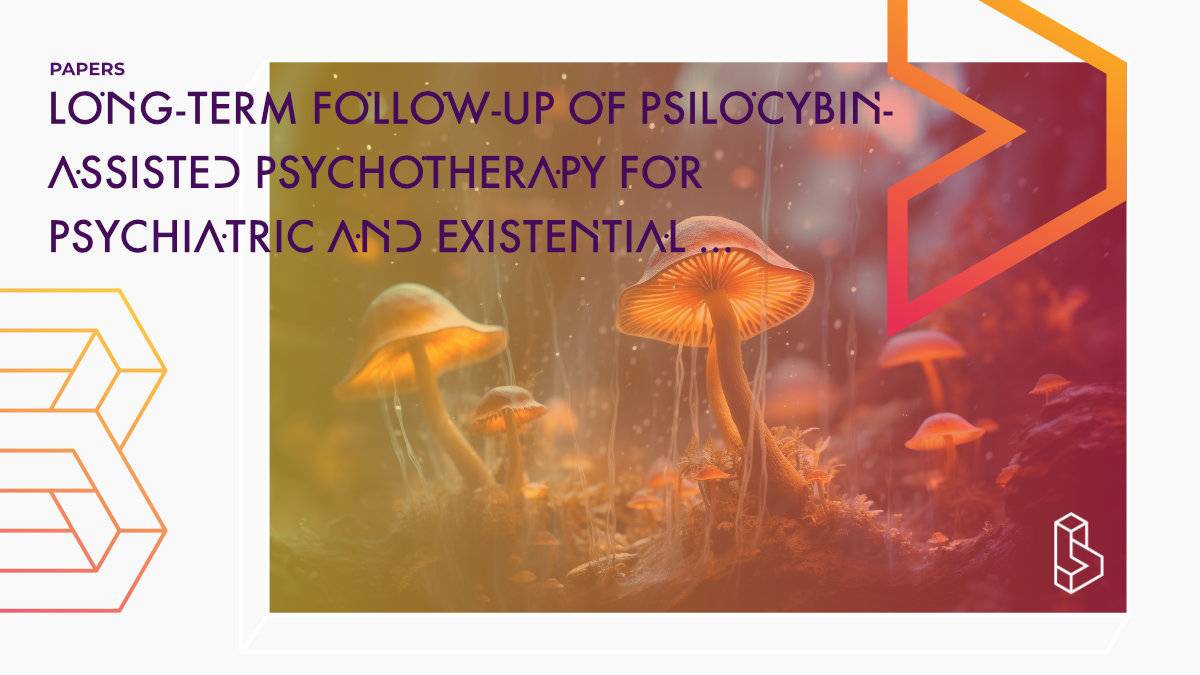This is a follow-up study (n=16) at an average of 3.8 years after a single dose of psilocybin, combined with psychotherapy, for patients suffering from cancer-related existential distress. Approximately 60-80% of participants experienced reduced anxiety or depressive symptoms. This adds to the body of research that indicates that the positive of a guided psychedelic experience can be long-lasting.
Abstract of Long-term follow-up of psilocybin-assisted psychotherapy for psychiatric and existential distress in patients with life-threatening cancer
“Background: A recently published randomized controlled trial compared single-dose psilocybin with single-dose niacin in conjunction with psychotherapy in participants with cancer-related psychiatric distress. Results suggested that psilocybin-assisted psychotherapy facilitated improvements in psychiatric and existential distress, quality of life, and spiritual well-being up to seven weeks prior to the crossover. At the 6.5-month follow-up, after the crossover, 60–80% of participants continued to meet criteria for clinically significant antidepressant or anxiolytic responses.
Methods: The present study is a long-term within-subjects follow-up analysis of self-reported symptomatology involving a subset of participants that completed the parent trial. All 16 participants who were still alive were contacted, and 15 participants agreed to participate at an average of 3.2 and 4.5 years following psilocybin administration.
Results: Reductions in anxiety, depression, hopelessness, demoralization, and death anxiety were sustained at the first and second follow-ups. Within-group effect sizes were large. At the second (4.5 years) follow-up approximately 60–80% of participants met criteria for clinically significant antidepressant or anxiolytic responses. Participants overwhelmingly (71–100%) attributed positive life changes to the psilocybin-assisted therapy experience and rated it among the most personally meaningful and spiritually significant experiences of their lives.
Conclusion: These findings suggest that psilocybin-assisted psychotherapy holds promise in promoting long-term relief from cancer-related psychiatric distress. Limited conclusions, however, can be drawn regarding the efficacy of this therapy due to the crossover design of the parent study. Nonetheless, the present study adds to the emerging literature base suggesting that psilocybin-facilitated therapy may enhance the psychological, emotional, and spiritual well-being of patients with life-threatening cancer.”
Authors: Gabrielle I. Agin-Liebes, Tara Malone, Matthew M. Yalch, Sarah E. Mennenga, K. Linnae Ponté, Jeffrey Guss, Anthony P. Bossis, Jim Grigsby, Stacy Fischer & Stephen Ross
Notes on Long-term follow-up of psilocybin-assisted psychotherapy for psychiatric and existential distress in patients with life-threatening cancer
This is a follow-up to Ross et al. (2016).
“Mystical-type experience scores (MEQ-30) collected on participant’s psilocybin dosing day in the parent study did not significantly correlate with primary outcome LTFU change scores (second long-term LTFU relative to the psilocybin dosing day) on any of the primary outcome measures of anxiety or depression.”
It’s interesting that in this study the level of mysticism didn’t have an influence on the long-term outcomes. Previous studies (e.g. Griffiths et al, 2006) have shown that mysticism – as perceived by the participant – has an influence on how transformative the experience was.
“Due to the limitations of the crossover design of the parent study, it is not possible to attribute long-term improvements in psychiatric and existential distress directly to psilocybin-assisted psychotherapy. The majority of participants met criteria for an adjustment disorder (on the DSM-IV-TR) relative to cancer-related stressors at enrollment, and 71% reported entering partial or complete cancer remission at the second LTFU. Participants may have thus experienced naturalistic or spontaneous diminishment of distress and resolution of their adjustment disorders as they entered remission and approached the five-year cancer survival threshold.”
This is important to note and to keep in mind that the very positive effects (and the 71-100% attribution to the session) should be put into this context. Yet at the same time, it could be the only (good) pharmacotherapy intervention we have.
“It is hopeful to consider the possibility that psilocybin-assisted psychotherapy could represent the first empirically-driven pharmacotherapy intervention to treat this indication.”
Summary of Long-term follow-up of psilocybin-assisted psychotherapy for psychiatric and existential distress in patients with life-threatening cancer
Cancer is a leading cause of morbidity and mortality globally, and psychiatric distress is common among cancer patients. This distress is associated with poor outcomes including decreased quality of life and cancer survival rates.
Psycho-oncology is increasingly recognizing the unique existential challenges accompanying a cancer diagnosis. Existing interventions, however, have limited efficacy and weak methodological study designs, and more rigorous, well-designed trials are needed to assess the efficacy of existing spiritual and existential interventions adequately.
Find this paper
https://doi.org/10.1177/0269881119897615
Paywall | Google Scholar | Backup | 🕊
Cite this paper (APA)
Agin-Liebes, G. I., Malone, T., Yalch, M. M., Mennenga, S. E., Ponté, K. L., Guss, J., ... & Ross, S. (2020). Long-term follow-up of psilocybin-assisted psychotherapy for psychiatric and existential distress in patients with life-threatening cancer. Journal of Psychopharmacology, 34(2), 155-166.
Study details
Compounds studied
Psilocybin
Topics studied
Anxiety
Palliative Care
Study characteristics
Original Re-analysis
Placebo-Controlled
Active Placebo
Double-Blind
Longitudinal
Randomized
Follow-up
Interviews
Participants
15
Humans
Institutes
Institutes associated with this publication
NYU Langone HealthThis company doesn't have a full profile yet, it is linked to a clinical trial.
Compound Details
The psychedelics given at which dose and how many times
Psilocybin 21 mgLinked Research Papers
Notable research papers that build on or are influenced by this paper
Rapid and sustained symptom reduction following psilocybin treatment for anxiety and depression in patients with life-threatening cancer: A randomized controlled trialThis double-blind placebo-controlled study (n=29) for those suffering from anxiety and depression, related to cancer, improved significantly (60-80% of participants) after a single dose of psilocybin (21mg/70kg) in combination with psychotherapy.
Linked Clinical Trial
Psilocybin Cancer Anxiety StudyThe primary objective of this double-blind, placebo-controlled pilot study is to assess the efficacy of psilocybin administration (4-phosphoryloxy-N,N-dimethyltryptamine), a serotonergic psychoactive agent, on psychosocial distress, with the specific primary outcome variable being anxiety associated with cancer. Secondary outcome measures will look at the effect of psilocybin on symptoms of pain perception, depression, existential/psychospiritual distress, attitudes towards disease progression and death, quality of life, and spiritual/mystical states of consciousness.

